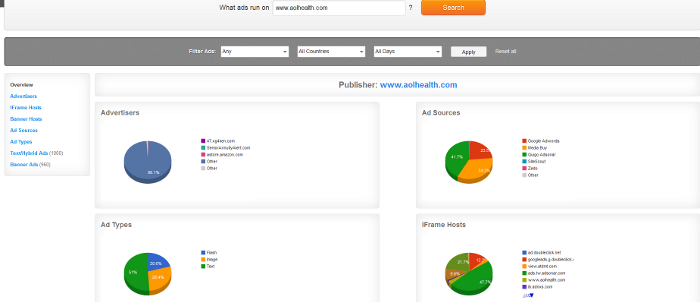WhatRunsWhere is a spy tool that crawls the web to gather data on advertising campaigns, both text and image-based, and sells that information. For example, you could use it to model an ad campaign off one your rivals used. Or an advertising outfit could use it to keep an eye on the competition.
The platform has been well-received, but it has tried to differentiate itself from similar services on cost, which co-founder Max Teitelbaum said runs at about five percent of the fees charged by the competition.
“What we wanted to do was make it affordable enough that anybody who had a business could afford it, but not so cheap that anybody could use it and we’d get flooded, and would need all that support,” he said.
The segments WhatRunsWhere was initially intended to sell target were businesses, digital marketers, and advertising agencies. Recently, the team has been surprised by an emerging segment comprised of publishers who want to find out who’s advertising on competitors’ sites as a leverage tool.
The company believes its crawling policies are solid legal ground, since it’s only categorizing publicly-accessible content. The company is DMCA-compliant, but has received no takedown requests to date. But that doesn’t mean everybody has been happy to find they were being spied on.
“We have gotten people who’ve said they’re not thrilled about us tracking them,” Teitelbaum said.
Teitelbaum has lived in Toronto his entire life. His first business venture involved gambling in Second Life, where he found he could make a couple thousand dollars a month.
“That’s the fucking shit when you’re 16,” he said.
After segueing into online advertising for a few years, he started talking with Mike Cojanu about monetizing the software that would become WhatRunsWhere, which the latter had developed for in-house advertising work.
The project, which is bootstrapped and has been cash positive almost since it launched publicly last year, has offices in California and Toronto, and now employs a staff of eight. Don’t worry, though: The process is fully automated. Nobody’s sitting in an office, manually sorting through all that data.
“We never wanted to start a place where we wouldn’t want to work,” said Teitelbaum, laughing.
Featured image: Eon Productions, Screencap: WhatRunsWhere


